ARTICLE AD BOX

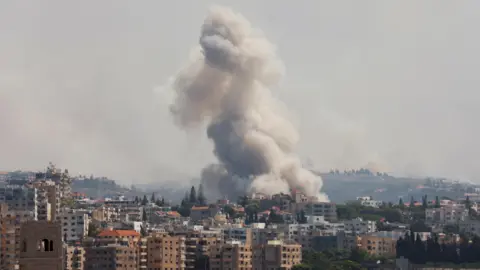 Reuters
Reuters
Smoke rose from areas near the southern Lebanese city of Tyre during the first wave of Israeli strikes on Monday morning
More than 270 people have been killed and 1,000 injured in intense Israeli air strikes across Lebanon, the country’s health minister says, after Israel warned it was “deepening” its attacks on the armed group Hezbollah.
Thousands of people also fled their homes as the Israeli military said it struck more than 800 Hezbollah targets and told civilians to evacuate areas near the Iran-backed group’s positions.
Hezbollah launched dozens of rockets into northern Israel following the strikes. Israeli paramedics said one person was injured by shrapnel.
It is the deadliest day in almost a year of escalating cross-border fighting that has heightened fears of all-out war.
UN Secretary General António Guterres said on Sunday that he feared such a conflict could turn Lebanon into “another Gaza”.
Eleven months of fighting between Hezbollah and Israel sparked by the war in Gaza have killed hundreds of people, most of them Hezbollah fighters, and displaced tens of thousands on both sides of the border.
Hezbollah has said it is acting in support of the Palestinian armed group Hamas and will not stop until there is a ceasefire in Gaza. Both groups are backed by Iran and proscribed as terrorist organisations by Israel, the UK and other countries.
Lebanese media reported that Israeli warplanes carried out the first wave of strikes across the country at around 06:30 (03:30 GMT) on Monday.
Dozens of locations were targeted in the southern districts of Sidon, Marjayoun, Nabatieh, Bint Jbeil, Tyre, Jezzine and Zahrani, as well as in several eastern districts in the Bekaa Valley, according to the state-run National News Agency (NNA).
Later, the NNA said the Israeli strikes intensified across the south and the Bekaa Valley, causing casualties and widespread damage.
Lebanese Health Minister Firas Abiad said on Monday afternoon that 274 people had been killed in the strikes and another 1,024 injured.
He did not report how many of the casualties were civilians or combatants but did say that 21 children and 31 women were among the dead.
Mr Abiad added that thousands of families had also been displaced by the strikes.
There were large traffic jams on roads out of the southern cities of Tyre and Sidon as civilians fled in response to the Israeli bombardment as well as recorded warnings from the Israeli military telling them to stay away from buildings and areas near Hezbollah positions and weaponry.
One man in Beirut said he had taken his son out of school after receiving such a warning.
"They’re calling everyone and threatening people by phone. So we’re here to take my boy from school. The situation is not reassuring,” Issa told Reuters news agency
Information Minister Ziad Makary said his ministry had been told to evacuate its building in Beirut, but he insisted that it would not comply with what he called “a psychological war”.
Interior Minister Bassam Mawlawi said schools would be opened in the south and east, Beirut and the northern city of Tripoli as shelters for the displaced.
Prime Minister Najib Mikati told a cabinet meeting: “The continued Israeli aggression on Lebanon is a war of extermination in every sense of the word.”
“We are working as a government to stop this new Israeli war and to avoid descending into the unknown,” he added.

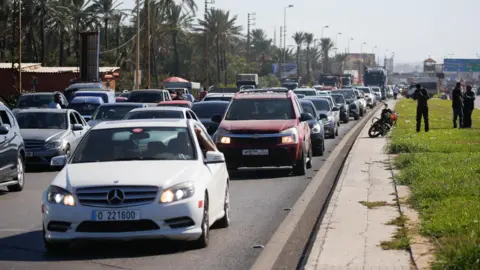 Reuters
Reuters
There was heavy traffic on roads heading north from Lebanon's southern coastal city of Sidon
The Israel Defense Forces (IDF) said in a statement on Monday afternoon that its aircraft had carried out strikes on approximately 800 Hezbollah "terror targets" in southern Lebanon and the Bekaa Valley.
Earlier, IDF spokesman Rear Admiral Daniel Hagari told a briefing that videos from southern Lebanon showed "Hezbollah's weapons exploding inside homes".
"Every house that we strike contains weapons - rockets, missiles, UAVs that are intended to kill Israeli civilians," he claimed.
He also warned civilians that they should move immediately away from Hezbollah weapons and rocket stores “for your safety and protection”.
Earlier, Defence Minister Yoav Gallant said in a video that Israeli forces were “deepening our attacks in Lebanon”. “The actions will continue until we achieve our goal to return the northern residents safely to their homes,” he added.
A senior Israeli military official meanwhile insisted that the IDF was “currently focusing on Israel’s aerial campaign only” after being asked by reporters if a ground invasion of southern Lebanon was imminent.
The official said Israel had three aims - to degrade Hezbollah's ability to fire rockets and missiles over the Lebanon-Israel border, to push its fighters back from the frontier, and to destroy the infrastructure built by Hezbollah’s elite Radwan Force which could be used to attack Israeli communities.

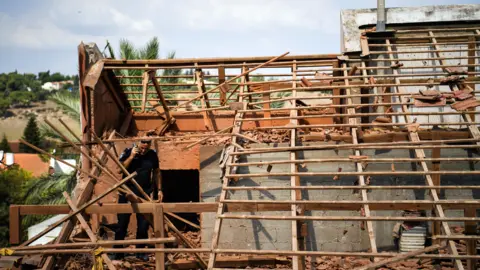 Reuters
Reuters
The roof of a house in northern Israel was destroyed by a rocket fired from Lebanon
Hezbollah did not comment on the Israeli claims that it had hidden weapons in houses, but the group said in a statement that it had responded to the “Israeli enemy’s attacks” by firing rockets at three Israeli military bases in northern Israel, as well as a weapons manufacturing facility in the coastal Zvulun area north of the port city of Haifa.
The IDF said at least 125 projectiles crossed from Lebanon, and that an unspecified number had landed in the Lower Galilee and Upper Galilee regions, as well as the Carmel, HaAmakim, and Hamifratz areas, near the coast, and in the occupied Golan Heights.
One house was badly damaged by a rocket in Givat Avni, in the Lower Galilee.
Resident David Yitzhak told the BBC that he, his wife and six-year-old daughter were unharmed because they had managed to get behind the solid door of the house's safe room seconds earlier, when a warning siren sounded.
“It’s a metre from life to death,” he said.
Israel’s ambulance service said it treated a 59-year-old man with shrapnel wounds to his lower limbs in the Lower Galilee, and that another man was injured as he rushed to shelter.
On Sunday, Hezbollah launched more than 150 rockets and drones across the border, while Israeli jets struck hundreds of targets across southern Lebanon.
Hezbollah has remained defiant despite suffering a series of significant setbacks last week.
On Tuesday and Wednesday, 39 people were killed and thousands were wounded after thousands of pagers and walkie-talkies used by Hezbollah exploded. And on Friday, Hezbollah said at least 16 members, including top commanders of its elite Radwan Force, were among 45 people killed in an Israeli air strike in southern Beirut.
Speaking at a funeral on Sunday, Hezbollah's deputy leader Naim Qassem said the group would not be deterred.
"We have entered a new phase,” he said, “the title of which is the open-ended battle of reckoning."

 3 months ago
19
3 months ago
19
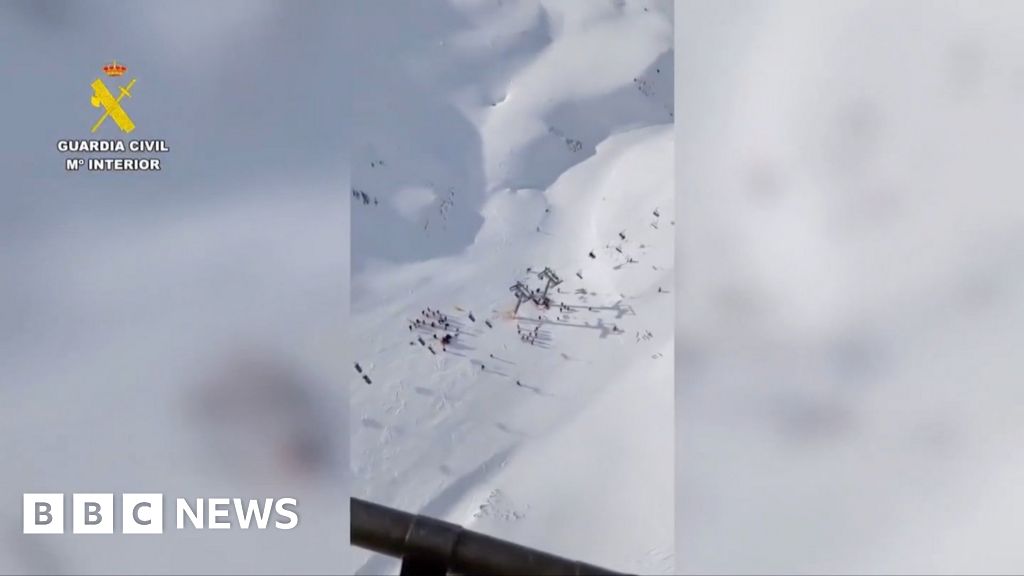
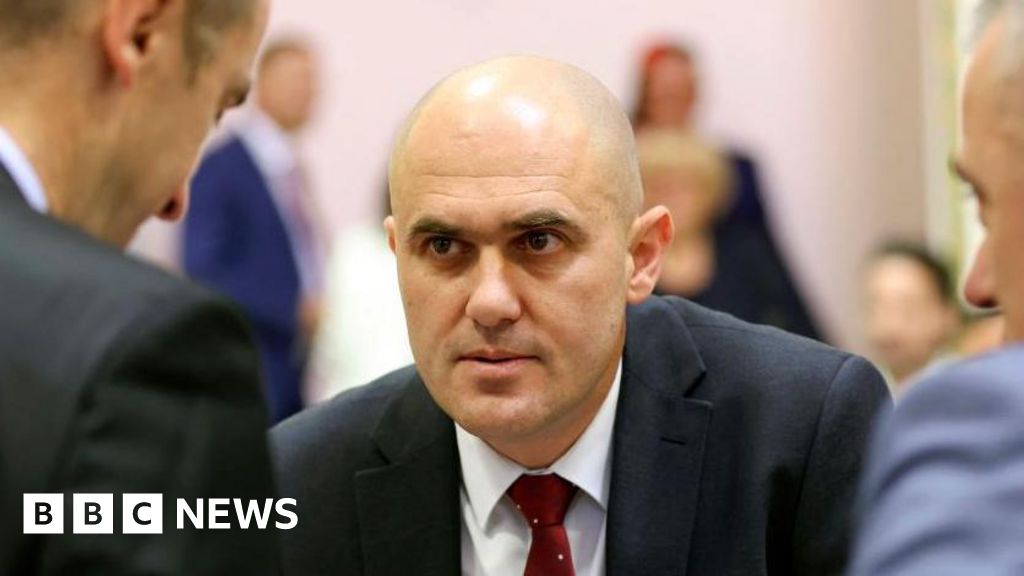
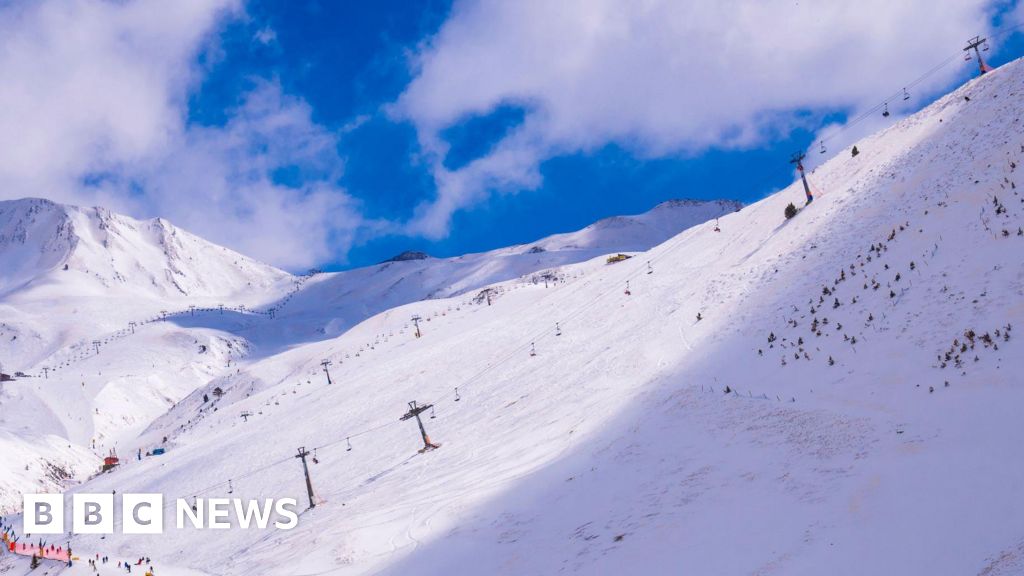





 English (US) ·
English (US) ·